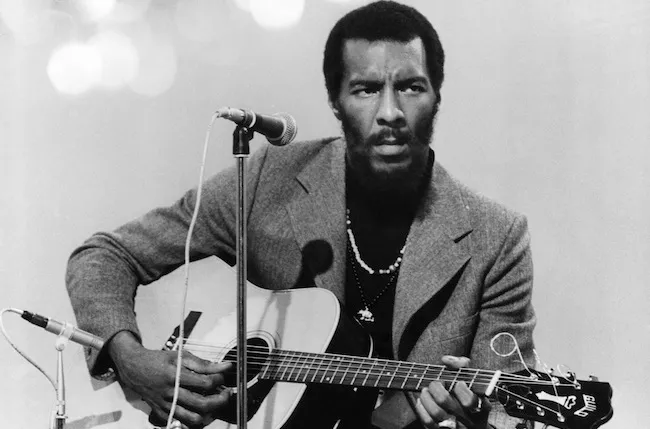The Folk Americana Roots Hall of Fame (FARHOF) held inauguration ceremonies for its first class of inductees over the weekend of April 19 and 20, 2024. Ceremonies included award presentations, live performances, tours, podcasts, and interviews. The events were not open to the public.
We continue our series honoring the FARHOF inductees with Richie Havens who rose to prominence during the Woodstock Music Festival in 1969.
* * * * *
By the time Richie Havens stepped on the stage at Woodstock, everyone in attendance on Max Yasgur’s dairy farm in Bethel, NY had to know something historic was taking place. He was the opening act but it wasn’t by choice so much as by chance. It was the first day of the festival and already the number of people pouring into the site was exceeding expectations. Traffic on the highways was so heavy massive traffic jams were occurring and the four acts scheduled ahead of Havens were delayed.
Richard Pierce Havens was born on January 21, 1941 in Brooklyn, NY, the oldest of nine children. He and his siblings were immersed in music from an early age. His father, Richard Havens, was a Blackfoot Native American who played piano by ear. His mother, Mildred, was a singer from the British West Indies. Richie started singing doo-wop music at thirteen. At sixteen, he formed a gospel group known as the McCrea Gospel Singers.
Richie left Brooklyn at 20 to seek artistic stimulation in Greenwich Village. “I saw the Village as a place to escape to, in order to express yourself,” he later recalled. “I had first gone there during the beatnik days of the 1950s to perform poetry, then I drew portraits for two years and stayed up all night listening to folk music in the clubs. It took a while before I thought of picking up a guitar.”
He made solo performances in the Village but soon was performing in other venues as well. Richie released five studio albums by 1969, although two of those albums were released by Douglas Records and were unauthorized. Richie’s star was rising even before he stepped on stage with his band mates, guitarist Paul “Deano” Williams and percussionist Daniel Ben Zebulon. But that performance would take his career to a higher level.
Originally asked to perform for a mere 20 minutes, he was kept on stage for more than two hours. The crowd responded favorably to his music and kept demanding more, according to Richie’s biographer Steve Davidowitz. Even after going through every song he knew he was asked for one more. The result was a riveting, improvised rendition of an old African American spiritual, “Motherless Child,” which later became known as “Freedom.” Almost immediately the song became identified with the pivotal movements of the period: civil rights, anti-war, free love, and feminism.
Richie Havens regarded his Woodstock appearance as “career making.” He certainly had a very long career, becoming a popular club act and was a familiar face on the outdoor festival circuit. Success as a live concert performer did not translate into huge record sales, however. His only single to chart in the American Top 20 was a cover of George Harrison’s “Here Comes The Sun” in 1971. Nonetheless, he had many followers and by any measure his career was rewarding.
Movies also benefited from his talents. He co-starred with Richard Pryor in the movie Greased Lightning, the true-life story of Wendell Scott, the first black stock car racer to win an upper tier NASCAR race. Richie also was composer for numerous movies including Green Lantern and Collateral.
Leaving the world a better place also was a goal of Richie’s. He cared passionately about teaching children and protecting the environment. In 1976, he co-founded North Wind Undersea Institute, a children’s oceanographic museum in the Bronx which trained harbor seals to perform underwater rescue missions. He also created The Natural Guard; an environmental organization dedicated to teaching inner city children about nature.
In 1993 Richie sang at the Inauguration of President Bill Clinton. He also performed several times for the Dalai Lama in support of the Tibetan Freedom Campaign. On April 28, 1998, Havens celebrated his Native American Heritage at the launch of the Native American Music Awards. In 2003, the National Music Council presented him the American Eagle Award for his role in United States musical development.
Richie had kidney surgery in 2010 from which he never fully recovered. Unable to tour and perform the way he had been doing for 45 years, in 2012 he announced he was retiring from the road. He died of a heart attack on April 22, 2013.
Richie Havens’ ashes were spread across the Woodstock fields on August 18, 2013, the 44th anniversary of the last day of the famed festival. In attendance at the ceremony were thirty family members, actors Danny Glover and Louis Gossett, and more than 1,000 fans.
Next up – John Prine

